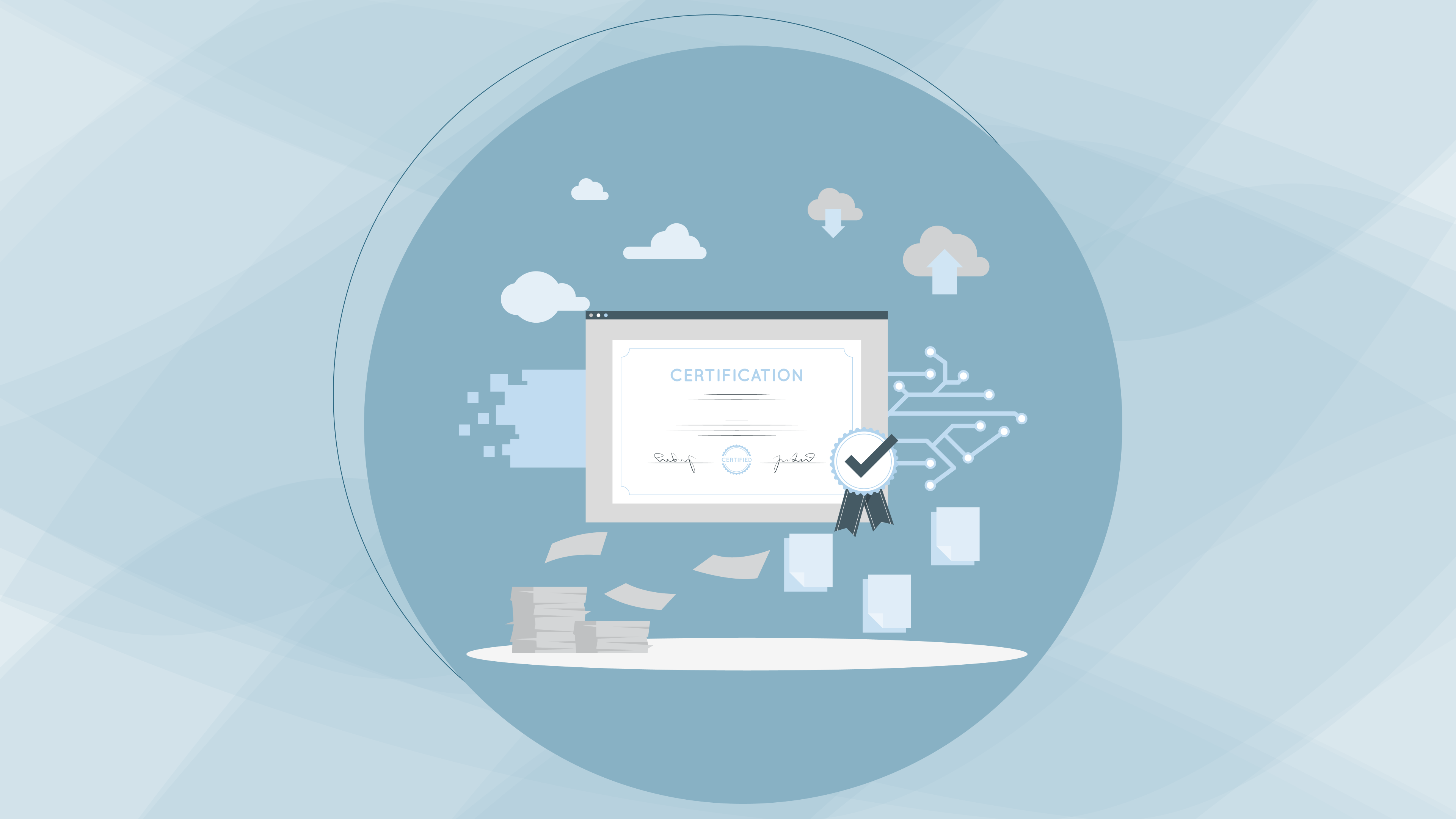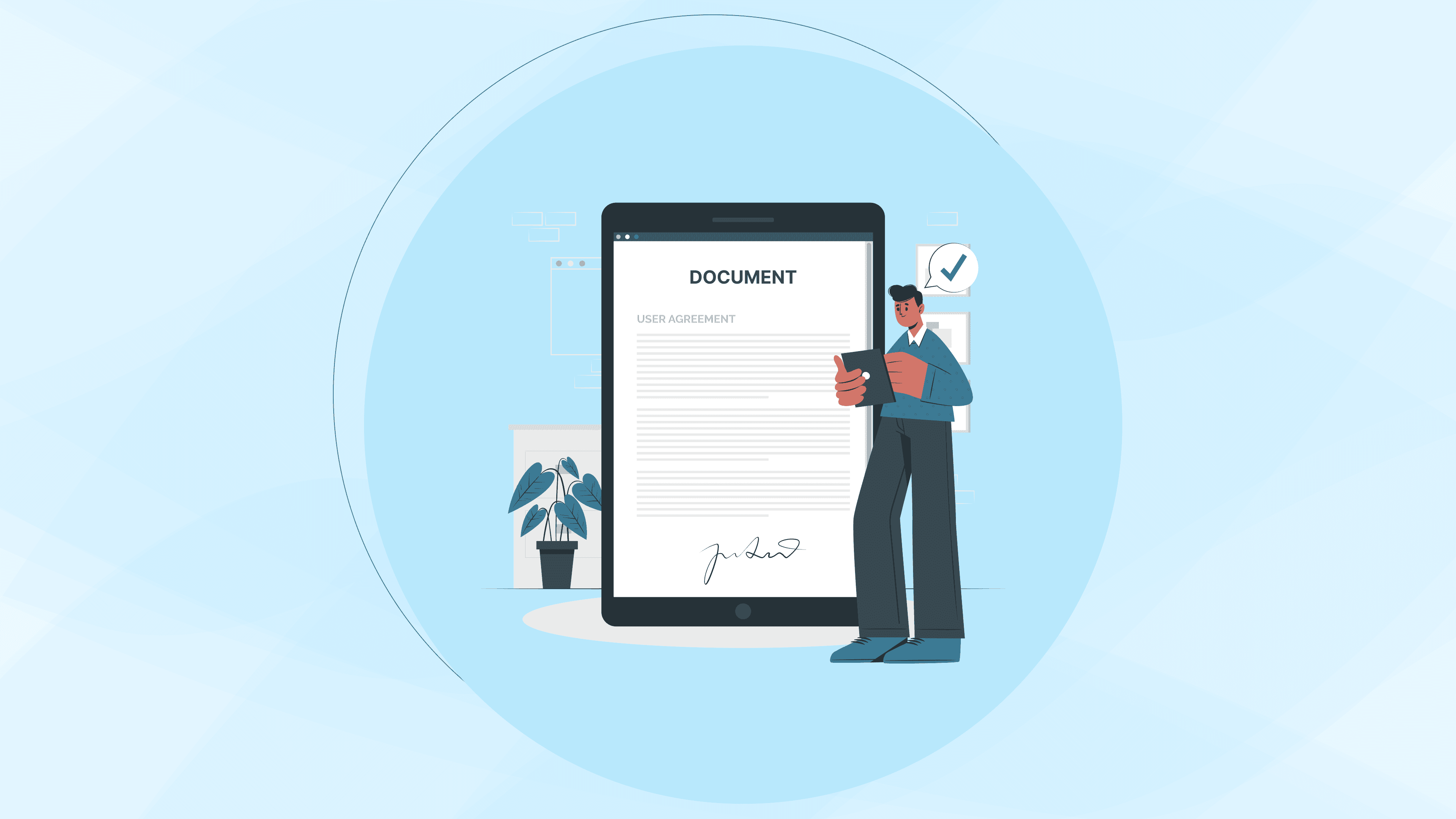Digital Certificates
Digital Certificates
Digital Certificates
Digital Certificates vs. Traditional Paper Certificates: Which is Better?
Digital Certificates vs. Traditional Paper Certificates: Which is Better?
Digital Certificates vs. Traditional Paper Certificates: Which is Better?
5 Nov 2024
5 Nov 2024
5 Nov 2024



In today’s digital-first world, both students and employees are finding new ways to earn and showcase their skills. One major decision facing individuals in these groups is choosing between traditional paper certificates and modern digital certificates.
Each has its own strengths and weaknesses, but with the rapid shift towards online learning and remote work, digital certificates are proving to be a more practical, flexible solution. This blog compares the benefits and limitations of each to help you decide which is best for building and showcasing your skills.
What Are Traditional Paper Certificates?
Traditional paper certificates are physical documents awarded by educational institutions, training programs, and employers to acknowledge a specific achievement, skill, or qualification. They typically include official seals or signatures, and students and employees often use these documents to showcase their qualifications to potential employers or academic institutions.
Examples of paper certificates:
University degrees and diplomas
Training certificates from workshops and seminars
Certifications from professional courses or in-person programs
What Are Digital Certificates?
Digital certificates are electronic, verifiable credentials issued by institutions, professional organizations, and online learning platforms. They are generally stored as digital files, such as PDFs or digital badges, and include encrypted information about the issuing authority, the recipient’s name, completion details, and a unique verification link.
Examples of digital certificates:
Online course completions from platforms like Coursera or LinkedIn Learning
Professional certifications from organizations like Google, Microsoft, or AWS
Digital badges awarded for specific skills, such as coding, data analysis, or project management
Comparing Digital and Traditional Certificates: Key Factors
Let’s break down the major aspects of each certificate type to see how they stack up in terms of practicality, impact, and career relevance.
1. Accessibility and Convenience
Digital Certificates:
Digital certificates are easy to access and store. You can save them in digital portfolios, cloud storage, or specific digital credential wallets. They’re available at any time and can be easily shared with employers or added to online profiles, such as LinkedIn, in a few clicks. Verification links and QR codes also make it easy for others to validate your credentials.
Traditional Paper Certificates:
Paper certificates require physical storage, which can be inconvenient, especially if you need to provide copies for job applications or keep them safe from damage. If you need to present a paper certificate for a job application, you often have to scan or mail it, which is less efficient and can delay the process.
Winner: Digital Certificates
Digital certificates are much easier to access, share, and store.
2. Security and Verification
Digital Certificates:
Digital certificates use encryption, unique links, and digital signatures, which make them difficult to forge or alter. Employers and institutions can quickly verify these certificates by scanning a QR code or checking a verification link, which prevents fraud and ensures credibility.
Traditional Paper Certificates:
While paper certificates often include official seals and signatures, they can be duplicated or forged with relative ease. Verifying a paper certificate may require contacting the issuing institution directly, which can be time-consuming for both students and employers.
Winner: Digital Certificates
With encryption and instant verification, digital certificates offer greater security and reliability.
3. Portability and Sharing
Digital Certificates:
Digital certificates are highly portable and can be shared instantly via email, uploaded to social media, or linked in digital portfolios. This portability is especially useful for remote work applications or when applying for multiple positions simultaneously.
Traditional Paper Certificates:
Paper certificates need to be scanned or photocopied to share, and mailing them can lead to delays. Physical certificates are also at risk of being lost or damaged over time, limiting their portability.
Winner: Digital Certificates
The ability to instantly share and access digital certificates makes them ideal for modern, fast-paced job markets.
4. Environmental Impact
Digital Certificates:
Digital certificates are environmentally friendly since they do not require paper, printing, or shipping. As we move towards a more sustainable future, reducing paper usage is an increasingly important consideration.
Traditional Paper Certificates:
Paper certificates require physical resources for production, which has an environmental impact. Paper, ink, and transportation all contribute to the carbon footprint of each certificate.
Winner: Digital Certificates
By eliminating the need for paper and printing, digital certificates are a greener option.
5. Cost and Ease of Replacement
Digital Certificates:
Since they are stored electronically, digital certificates are easy to replace if lost. Most issuing organizations allow you to re-download them, and there’s no additional cost for replacement. This is particularly advantageous if you’re managing multiple certificates over your career.
Traditional Paper Certificates:
Replacing a lost or damaged paper certificate can be costly and time-consuming, as it usually requires a formal request and additional fees from the issuing institution. In some cases, replacements may not be issued for older certificates.
Winner: Digital Certificates
Digital certificates are cost-effective and easy to replace if lost.
When Should You Choose Digital Certificates?
Digital certificates are best for students and employees who need accessible, verifiable, and portable credentials that can be quickly shared and verified by employers. They’re ideal for online courses, technical skills, and professional certifications that are frequently updated or need easy access. In today’s digital job market, having these credentials at your fingertips is a major advantage.
Benefits of Digital Certificates for Students and Employees:
Quick verification and sharing for applications
Instant updating on LinkedIn and other professional platforms
Reduced environmental impact
Easy integration with digital resumes, online portfolios, and cloud storage
When Do Paper Certificates Still Make Sense?
While digital certificates are superior in many ways, traditional paper certificates may still be valuable for certain achievements or milestones, such as:
University Diplomas: Graduation certificates often have sentimental and symbolic value. Many graduates still appreciate having a framed diploma as a physical testament to their hard work.
High-Impact Achievements: In industries that value physical certificates, such as law or medicine, some credentials are still expected in paper form and may make a stronger impression in traditional settings.
Benefits of Paper Certificates for Certain Situations:
Physical presence in interviews or presentations
Tangible representation of major academic achievements or milestones
Recognition in more formal, traditional career fields
Final Verdict: Which Is Better for Your Career?
For most students and employees, digital certificates offer far more advantages in terms of usability, verification, security, and environmental impact. They integrate seamlessly with the digital platforms that recruiters and hiring managers use today, making them the best option for most career fields. The flexibility and immediate accessibility of digital certificates make them a powerful tool for showcasing your skills, enhancing your resume, and standing out to potential employers.
Key Takeaway
Digital certificates are a modern, efficient way to validate your skills and qualifications, allowing you to move confidently in a fast-paced job market. They’re easy to access, share, and verify, making them the best choice for most students and employees looking to impress hiring managers and advance their careers. Traditional paper certificates still have their place for high-impact achievements, but for daily use, digital certificates are the clear winner in 2025.
In today’s digital-first world, both students and employees are finding new ways to earn and showcase their skills. One major decision facing individuals in these groups is choosing between traditional paper certificates and modern digital certificates.
Each has its own strengths and weaknesses, but with the rapid shift towards online learning and remote work, digital certificates are proving to be a more practical, flexible solution. This blog compares the benefits and limitations of each to help you decide which is best for building and showcasing your skills.
What Are Traditional Paper Certificates?
Traditional paper certificates are physical documents awarded by educational institutions, training programs, and employers to acknowledge a specific achievement, skill, or qualification. They typically include official seals or signatures, and students and employees often use these documents to showcase their qualifications to potential employers or academic institutions.
Examples of paper certificates:
University degrees and diplomas
Training certificates from workshops and seminars
Certifications from professional courses or in-person programs
What Are Digital Certificates?
Digital certificates are electronic, verifiable credentials issued by institutions, professional organizations, and online learning platforms. They are generally stored as digital files, such as PDFs or digital badges, and include encrypted information about the issuing authority, the recipient’s name, completion details, and a unique verification link.
Examples of digital certificates:
Online course completions from platforms like Coursera or LinkedIn Learning
Professional certifications from organizations like Google, Microsoft, or AWS
Digital badges awarded for specific skills, such as coding, data analysis, or project management
Comparing Digital and Traditional Certificates: Key Factors
Let’s break down the major aspects of each certificate type to see how they stack up in terms of practicality, impact, and career relevance.
1. Accessibility and Convenience
Digital Certificates:
Digital certificates are easy to access and store. You can save them in digital portfolios, cloud storage, or specific digital credential wallets. They’re available at any time and can be easily shared with employers or added to online profiles, such as LinkedIn, in a few clicks. Verification links and QR codes also make it easy for others to validate your credentials.
Traditional Paper Certificates:
Paper certificates require physical storage, which can be inconvenient, especially if you need to provide copies for job applications or keep them safe from damage. If you need to present a paper certificate for a job application, you often have to scan or mail it, which is less efficient and can delay the process.
Winner: Digital Certificates
Digital certificates are much easier to access, share, and store.
2. Security and Verification
Digital Certificates:
Digital certificates use encryption, unique links, and digital signatures, which make them difficult to forge or alter. Employers and institutions can quickly verify these certificates by scanning a QR code or checking a verification link, which prevents fraud and ensures credibility.
Traditional Paper Certificates:
While paper certificates often include official seals and signatures, they can be duplicated or forged with relative ease. Verifying a paper certificate may require contacting the issuing institution directly, which can be time-consuming for both students and employers.
Winner: Digital Certificates
With encryption and instant verification, digital certificates offer greater security and reliability.
3. Portability and Sharing
Digital Certificates:
Digital certificates are highly portable and can be shared instantly via email, uploaded to social media, or linked in digital portfolios. This portability is especially useful for remote work applications or when applying for multiple positions simultaneously.
Traditional Paper Certificates:
Paper certificates need to be scanned or photocopied to share, and mailing them can lead to delays. Physical certificates are also at risk of being lost or damaged over time, limiting their portability.
Winner: Digital Certificates
The ability to instantly share and access digital certificates makes them ideal for modern, fast-paced job markets.
4. Environmental Impact
Digital Certificates:
Digital certificates are environmentally friendly since they do not require paper, printing, or shipping. As we move towards a more sustainable future, reducing paper usage is an increasingly important consideration.
Traditional Paper Certificates:
Paper certificates require physical resources for production, which has an environmental impact. Paper, ink, and transportation all contribute to the carbon footprint of each certificate.
Winner: Digital Certificates
By eliminating the need for paper and printing, digital certificates are a greener option.
5. Cost and Ease of Replacement
Digital Certificates:
Since they are stored electronically, digital certificates are easy to replace if lost. Most issuing organizations allow you to re-download them, and there’s no additional cost for replacement. This is particularly advantageous if you’re managing multiple certificates over your career.
Traditional Paper Certificates:
Replacing a lost or damaged paper certificate can be costly and time-consuming, as it usually requires a formal request and additional fees from the issuing institution. In some cases, replacements may not be issued for older certificates.
Winner: Digital Certificates
Digital certificates are cost-effective and easy to replace if lost.
When Should You Choose Digital Certificates?
Digital certificates are best for students and employees who need accessible, verifiable, and portable credentials that can be quickly shared and verified by employers. They’re ideal for online courses, technical skills, and professional certifications that are frequently updated or need easy access. In today’s digital job market, having these credentials at your fingertips is a major advantage.
Benefits of Digital Certificates for Students and Employees:
Quick verification and sharing for applications
Instant updating on LinkedIn and other professional platforms
Reduced environmental impact
Easy integration with digital resumes, online portfolios, and cloud storage
When Do Paper Certificates Still Make Sense?
While digital certificates are superior in many ways, traditional paper certificates may still be valuable for certain achievements or milestones, such as:
University Diplomas: Graduation certificates often have sentimental and symbolic value. Many graduates still appreciate having a framed diploma as a physical testament to their hard work.
High-Impact Achievements: In industries that value physical certificates, such as law or medicine, some credentials are still expected in paper form and may make a stronger impression in traditional settings.
Benefits of Paper Certificates for Certain Situations:
Physical presence in interviews or presentations
Tangible representation of major academic achievements or milestones
Recognition in more formal, traditional career fields
Final Verdict: Which Is Better for Your Career?
For most students and employees, digital certificates offer far more advantages in terms of usability, verification, security, and environmental impact. They integrate seamlessly with the digital platforms that recruiters and hiring managers use today, making them the best option for most career fields. The flexibility and immediate accessibility of digital certificates make them a powerful tool for showcasing your skills, enhancing your resume, and standing out to potential employers.
Key Takeaway
Digital certificates are a modern, efficient way to validate your skills and qualifications, allowing you to move confidently in a fast-paced job market. They’re easy to access, share, and verify, making them the best choice for most students and employees looking to impress hiring managers and advance their careers. Traditional paper certificates still have their place for high-impact achievements, but for daily use, digital certificates are the clear winner in 2025.
In today’s digital-first world, both students and employees are finding new ways to earn and showcase their skills. One major decision facing individuals in these groups is choosing between traditional paper certificates and modern digital certificates.
Each has its own strengths and weaknesses, but with the rapid shift towards online learning and remote work, digital certificates are proving to be a more practical, flexible solution. This blog compares the benefits and limitations of each to help you decide which is best for building and showcasing your skills.
What Are Traditional Paper Certificates?
Traditional paper certificates are physical documents awarded by educational institutions, training programs, and employers to acknowledge a specific achievement, skill, or qualification. They typically include official seals or signatures, and students and employees often use these documents to showcase their qualifications to potential employers or academic institutions.
Examples of paper certificates:
University degrees and diplomas
Training certificates from workshops and seminars
Certifications from professional courses or in-person programs
What Are Digital Certificates?
Digital certificates are electronic, verifiable credentials issued by institutions, professional organizations, and online learning platforms. They are generally stored as digital files, such as PDFs or digital badges, and include encrypted information about the issuing authority, the recipient’s name, completion details, and a unique verification link.
Examples of digital certificates:
Online course completions from platforms like Coursera or LinkedIn Learning
Professional certifications from organizations like Google, Microsoft, or AWS
Digital badges awarded for specific skills, such as coding, data analysis, or project management
Comparing Digital and Traditional Certificates: Key Factors
Let’s break down the major aspects of each certificate type to see how they stack up in terms of practicality, impact, and career relevance.
1. Accessibility and Convenience
Digital Certificates:
Digital certificates are easy to access and store. You can save them in digital portfolios, cloud storage, or specific digital credential wallets. They’re available at any time and can be easily shared with employers or added to online profiles, such as LinkedIn, in a few clicks. Verification links and QR codes also make it easy for others to validate your credentials.
Traditional Paper Certificates:
Paper certificates require physical storage, which can be inconvenient, especially if you need to provide copies for job applications or keep them safe from damage. If you need to present a paper certificate for a job application, you often have to scan or mail it, which is less efficient and can delay the process.
Winner: Digital Certificates
Digital certificates are much easier to access, share, and store.
2. Security and Verification
Digital Certificates:
Digital certificates use encryption, unique links, and digital signatures, which make them difficult to forge or alter. Employers and institutions can quickly verify these certificates by scanning a QR code or checking a verification link, which prevents fraud and ensures credibility.
Traditional Paper Certificates:
While paper certificates often include official seals and signatures, they can be duplicated or forged with relative ease. Verifying a paper certificate may require contacting the issuing institution directly, which can be time-consuming for both students and employers.
Winner: Digital Certificates
With encryption and instant verification, digital certificates offer greater security and reliability.
3. Portability and Sharing
Digital Certificates:
Digital certificates are highly portable and can be shared instantly via email, uploaded to social media, or linked in digital portfolios. This portability is especially useful for remote work applications or when applying for multiple positions simultaneously.
Traditional Paper Certificates:
Paper certificates need to be scanned or photocopied to share, and mailing them can lead to delays. Physical certificates are also at risk of being lost or damaged over time, limiting their portability.
Winner: Digital Certificates
The ability to instantly share and access digital certificates makes them ideal for modern, fast-paced job markets.
4. Environmental Impact
Digital Certificates:
Digital certificates are environmentally friendly since they do not require paper, printing, or shipping. As we move towards a more sustainable future, reducing paper usage is an increasingly important consideration.
Traditional Paper Certificates:
Paper certificates require physical resources for production, which has an environmental impact. Paper, ink, and transportation all contribute to the carbon footprint of each certificate.
Winner: Digital Certificates
By eliminating the need for paper and printing, digital certificates are a greener option.
5. Cost and Ease of Replacement
Digital Certificates:
Since they are stored electronically, digital certificates are easy to replace if lost. Most issuing organizations allow you to re-download them, and there’s no additional cost for replacement. This is particularly advantageous if you’re managing multiple certificates over your career.
Traditional Paper Certificates:
Replacing a lost or damaged paper certificate can be costly and time-consuming, as it usually requires a formal request and additional fees from the issuing institution. In some cases, replacements may not be issued for older certificates.
Winner: Digital Certificates
Digital certificates are cost-effective and easy to replace if lost.
When Should You Choose Digital Certificates?
Digital certificates are best for students and employees who need accessible, verifiable, and portable credentials that can be quickly shared and verified by employers. They’re ideal for online courses, technical skills, and professional certifications that are frequently updated or need easy access. In today’s digital job market, having these credentials at your fingertips is a major advantage.
Benefits of Digital Certificates for Students and Employees:
Quick verification and sharing for applications
Instant updating on LinkedIn and other professional platforms
Reduced environmental impact
Easy integration with digital resumes, online portfolios, and cloud storage
When Do Paper Certificates Still Make Sense?
While digital certificates are superior in many ways, traditional paper certificates may still be valuable for certain achievements or milestones, such as:
University Diplomas: Graduation certificates often have sentimental and symbolic value. Many graduates still appreciate having a framed diploma as a physical testament to their hard work.
High-Impact Achievements: In industries that value physical certificates, such as law or medicine, some credentials are still expected in paper form and may make a stronger impression in traditional settings.
Benefits of Paper Certificates for Certain Situations:
Physical presence in interviews or presentations
Tangible representation of major academic achievements or milestones
Recognition in more formal, traditional career fields
Final Verdict: Which Is Better for Your Career?
For most students and employees, digital certificates offer far more advantages in terms of usability, verification, security, and environmental impact. They integrate seamlessly with the digital platforms that recruiters and hiring managers use today, making them the best option for most career fields. The flexibility and immediate accessibility of digital certificates make them a powerful tool for showcasing your skills, enhancing your resume, and standing out to potential employers.
Key Takeaway
Digital certificates are a modern, efficient way to validate your skills and qualifications, allowing you to move confidently in a fast-paced job market. They’re easy to access, share, and verify, making them the best choice for most students and employees looking to impress hiring managers and advance their careers. Traditional paper certificates still have their place for high-impact achievements, but for daily use, digital certificates are the clear winner in 2025.
Schedule your Free Demo
Fuel Your Organization’s Growth with the Future of Digital Credentials
Read More Blogs
Read More Blogs
Read More Blogs

how to download Issued certificate from digilocker
5 Feb 2025

How Do I Verify a Digital Certificate in Education?
1 Feb 2025

How to check whether a certificate is real or fake?
1 Feb 2025
